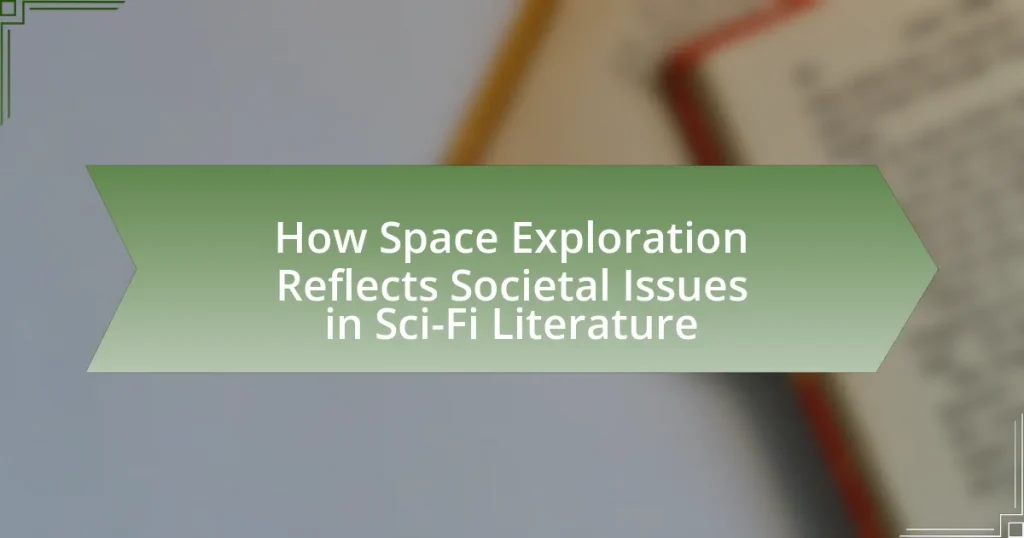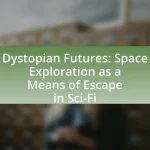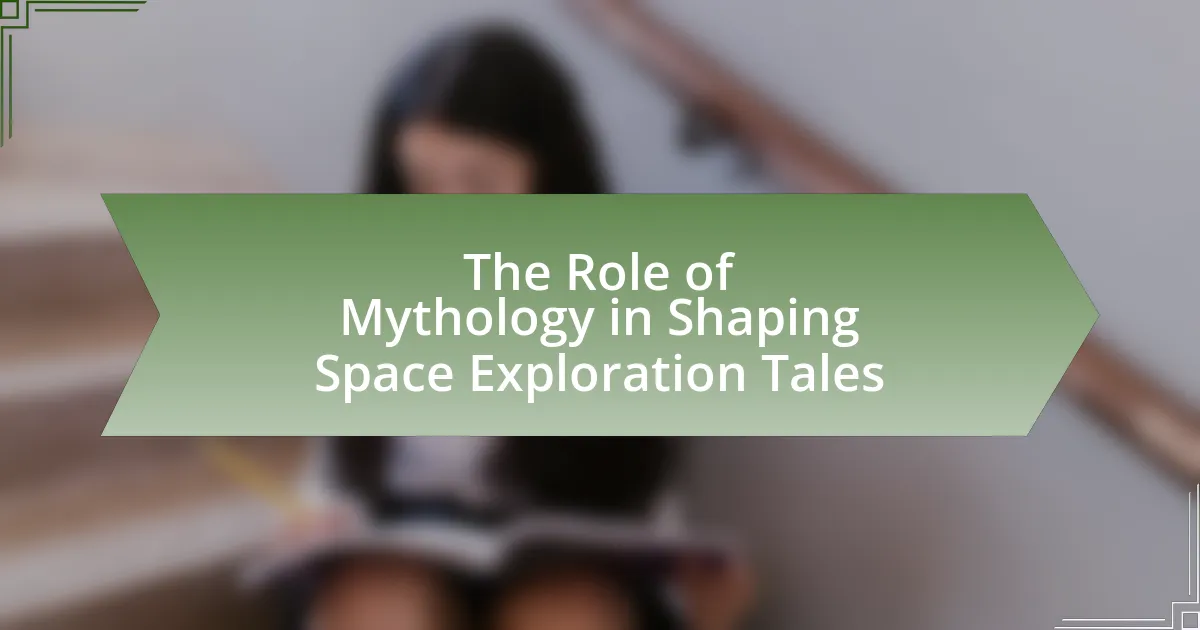The article examines how space exploration in science fiction literature reflects various societal issues, including ethical dilemmas, inequality, and environmental concerns. It highlights key works by authors such as Arthur C. Clarke, Octavia Butler, and Ursula K. Le Guin, illustrating how their narratives critique contemporary social dynamics and provoke reflection on humanity’s values. The discussion encompasses themes of technological advancement, colonization, and identity, emphasizing the role of sci-fi as a lens through which readers can engage with and understand pressing societal challenges. Additionally, the article explores the impact of historical events and current global issues on these narratives, underscoring the relevance of sci-fi literature in shaping public perception of space exploration and its ethical implications.
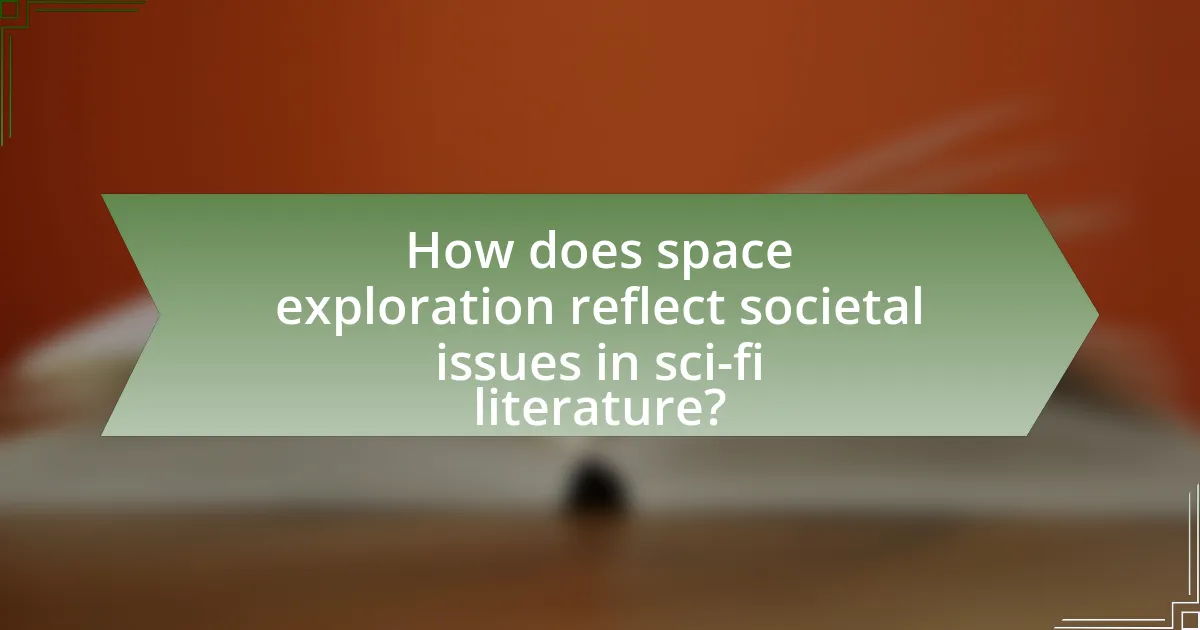
How does space exploration reflect societal issues in sci-fi literature?
Space exploration in sci-fi literature serves as a mirror to societal issues by illustrating humanity’s aspirations, fears, and ethical dilemmas. For instance, works like Arthur C. Clarke’s “2001: A Space Odyssey” explore themes of artificial intelligence and human evolution, reflecting contemporary anxieties about technology’s role in society. Similarly, Octavia Butler’s “Parable of the Sower” addresses social inequality and climate change, projecting current societal challenges into a future context. These narratives often critique existing power structures, such as colonialism and capitalism, by depicting interstellar colonization and resource exploitation, thereby prompting readers to reflect on their own societal values and behaviors.
What are the key societal issues depicted in sci-fi literature related to space exploration?
Key societal issues depicted in sci-fi literature related to space exploration include the ethical implications of colonization, the consequences of technological advancement, and the exploration of identity and humanity. For instance, works like “The Dispossessed” by Ursula K. Le Guin examine the moral dilemmas of colonizing new worlds and the impact on indigenous populations. Additionally, novels such as “Neuromancer” by William Gibson highlight the potential dangers of unchecked technological progress, including surveillance and loss of privacy. Furthermore, stories like “The Left Hand of Darkness,” also by Le Guin, explore themes of gender and identity in alien societies, prompting readers to reflect on their own societal norms. These narratives serve as a mirror to contemporary issues, illustrating how space exploration can amplify existing societal challenges.
How do themes of inequality manifest in space exploration narratives?
Themes of inequality manifest in space exploration narratives through the portrayal of access to technology, representation of marginalized groups, and the socio-economic disparities that influence who participates in space missions. For instance, in works like “The Expanse” series by James S.A. Corey, the divide between Earth, Mars, and the Belt highlights class struggles and resource allocation, illustrating how wealth and power dictate access to space. Additionally, narratives often reflect historical inequalities, such as the underrepresentation of women and people of color in both fictional and real-life space programs, as seen in the film “Hidden Figures,” which showcases the contributions of African American women to NASA during the Space Race. These examples underscore how space exploration serves as a microcosm for broader societal issues, revealing entrenched inequalities that persist in both fictional and real-world contexts.
What role does environmentalism play in sci-fi space exploration stories?
Environmentalism serves as a critical theme in sci-fi space exploration stories, often highlighting the consequences of ecological neglect and the importance of sustainable practices. These narratives frequently depict dystopian futures where environmental degradation on Earth prompts humanity to seek refuge in space, illustrating the urgent need for responsible stewardship of planetary resources. For instance, in Kim Stanley Robinson’s “Mars Trilogy,” the terraforming of Mars is portrayed as both a technological achievement and a cautionary tale about ecological balance, emphasizing the interconnectedness of human actions and environmental health. Such stories not only entertain but also provoke reflection on real-world environmental issues, urging readers to consider the implications of their choices on both Earth and potential new worlds.
How is technology portrayed as a societal issue in these narratives?
Technology is portrayed as a societal issue in these narratives by highlighting its dual role as both a tool for advancement and a source of ethical dilemmas. In many sci-fi stories, the rapid development of technology leads to societal disparities, where access to advanced tools creates a divide between different social classes. For instance, in works like “The Moon is a Harsh Mistress” by Robert A. Heinlein, technology facilitates rebellion against oppressive regimes, illustrating how it can empower marginalized groups. Conversely, narratives such as “Black Mirror” explore the darker consequences of technological dependence, showcasing how innovations can lead to surveillance, loss of privacy, and social alienation. These examples underscore the complex relationship between technology and society, emphasizing that while it can drive progress, it also raises critical ethical questions that reflect contemporary societal concerns.
Why is space exploration a significant backdrop for discussing societal issues?
Space exploration serves as a significant backdrop for discussing societal issues because it reflects humanity’s aspirations, challenges, and ethical dilemmas. The vastness of space symbolizes both the potential for discovery and the consequences of human actions, prompting discussions about resource allocation, environmental sustainability, and social equity. For instance, the Apollo program not only advanced technology but also highlighted issues of racial inequality and economic disparity in the United States during the 1960s. Furthermore, contemporary debates surrounding space colonization raise questions about governance, ownership, and the impact on indigenous cultures, mirroring ongoing societal conflicts on Earth. Thus, space exploration acts as a lens through which we can examine and critique our values and priorities as a society.
How does the vastness of space serve as a metaphor for societal challenges?
The vastness of space serves as a metaphor for societal challenges by illustrating the overwhelming nature of issues such as inequality, conflict, and environmental degradation. This metaphor highlights how, much like the infinite expanse of the universe, societal problems can seem insurmountable and complex. For instance, in science fiction literature, authors often depict space as a frontier that reflects humanity’s struggles, emphasizing the need for cooperation and innovation to overcome these challenges. Works like Arthur C. Clarke’s “Rendezvous with Rama” showcase how humanity must unite to face the unknown, paralleling real-world societal issues that require collective action and understanding.
What historical events influence the portrayal of societal issues in space exploration literature?
The portrayal of societal issues in space exploration literature is significantly influenced by historical events such as the Cold War, the Space Race, and the Civil Rights Movement. The Cold War, particularly the competition between the United States and the Soviet Union, fostered a narrative of technological advancement and existential threat, which is reflected in works like Arthur C. Clarke’s “2001: A Space Odyssey.” The Space Race, culminating in the Apollo 11 moon landing in 1969, inspired themes of human achievement and exploration, as seen in novels like Ray Bradbury’s “The Martian Chronicles.” Additionally, the Civil Rights Movement prompted authors to explore themes of equality and diversity in space settings, as illustrated in Octavia Butler’s “Kindred,” which addresses race and identity. These events collectively shape the societal issues depicted in space exploration literature, providing a lens through which authors critique contemporary social dynamics.
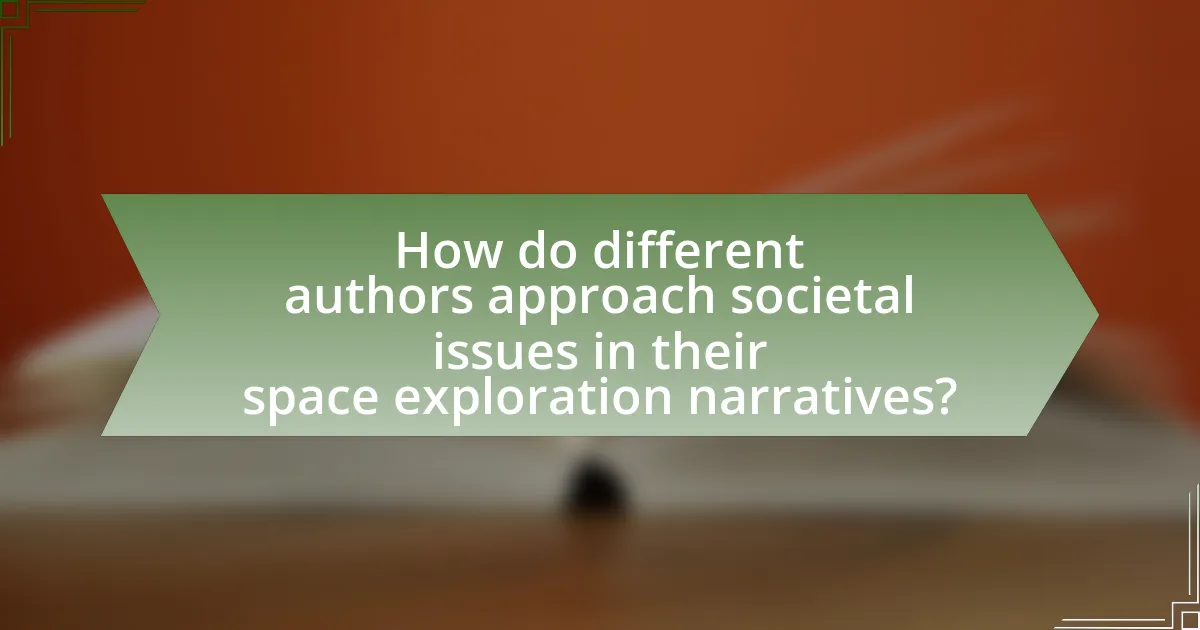
How do different authors approach societal issues in their space exploration narratives?
Different authors approach societal issues in their space exploration narratives by using the backdrop of space to reflect and critique contemporary social, political, and ethical dilemmas. For instance, Arthur C. Clarke’s “Rendezvous with Rama” explores themes of cultural misunderstanding and the consequences of human hubris in the face of the unknown, illustrating how humanity’s interactions with alien civilizations can mirror real-world conflicts. Similarly, Octavia Butler’s “Parable of the Sower” addresses issues of climate change, inequality, and societal collapse, using a dystopian future to comment on current environmental and social crises. These narratives serve as a lens through which authors examine and challenge existing societal norms, encouraging readers to reflect on the implications of humanity’s quest for exploration and the ethical responsibilities that accompany it.
What are the distinct styles of notable sci-fi authors in addressing societal issues?
Notable sci-fi authors employ distinct styles to address societal issues, often reflecting contemporary concerns through speculative narratives. For instance, Isaac Asimov’s works frequently explore the ethical implications of technology and artificial intelligence, as seen in “I, Robot,” where he examines the moral dilemmas posed by robots in society. In contrast, Ursula K. Le Guin utilizes anthropological perspectives in her novels, such as “The Dispossessed,” to critique capitalism and explore anarchist ideals through the lens of different societies. Philip K. Dick often delves into themes of identity and reality, as demonstrated in “Do Androids Dream of Electric Sheep?” where he questions the nature of humanity in a technologically advanced world. These authors’ unique approaches highlight various societal issues, from ethics and economics to identity and technology, making their works relevant to ongoing discussions in society.
How does Isaac Asimov’s work reflect societal concerns through space exploration?
Isaac Asimov’s work reflects societal concerns through space exploration by addressing themes such as ethics, technology, and human behavior in the context of interstellar travel. In his stories, particularly the “Foundation” series and “Robot” series, Asimov explores the implications of advanced technology on society, including the potential for both progress and destruction. For instance, the Three Laws of Robotics illustrate the ethical dilemmas surrounding artificial intelligence and its impact on human life, highlighting fears of loss of control over technology. Additionally, Asimov’s depiction of space colonization raises questions about resource allocation, environmental sustainability, and the consequences of imperialism, mirroring contemporary societal debates about these issues. His narratives serve as a reflection of the anxieties and aspirations of his time, making them relevant to ongoing discussions about humanity’s future in space.
What societal issues are highlighted in Arthur C. Clarke’s space narratives?
Arthur C. Clarke’s space narratives highlight several societal issues, including the ethical implications of technological advancement, the potential for human conflict, and the exploration of existential questions regarding humanity’s place in the universe. For instance, in “2001: A Space Odyssey,” Clarke examines the consequences of artificial intelligence and the moral dilemmas it presents, reflecting contemporary concerns about technology’s impact on society. Additionally, his works often address the theme of cooperation versus conflict among nations, as seen in “Rendezvous with Rama,” where humanity must unite to face an unknown extraterrestrial encounter. These narratives serve as a mirror to societal anxieties about progress, cooperation, and the future of humanity.
How do contemporary authors tackle modern societal issues in their space exploration stories?
Contemporary authors address modern societal issues in their space exploration stories by using futuristic settings to mirror current challenges such as climate change, inequality, and technological ethics. For instance, in Kim Stanley Robinson’s “The Ministry for the Future,” the narrative explores climate crisis responses through speculative technologies and global governance, reflecting real-world debates on environmental policy. Similarly, Nnedi Okorafor’s “Binti” series tackles themes of cultural identity and diaspora, illustrating how space travel can serve as a metaphor for migration and belonging. These authors effectively use the backdrop of space exploration to provoke thought and discussion about pressing societal issues, demonstrating the relevance of their narratives to contemporary life.
What themes of diversity and inclusion are present in recent sci-fi literature?
Recent sci-fi literature prominently features themes of diversity and inclusion, particularly through the representation of marginalized groups, exploration of identity, and the critique of societal norms. Authors increasingly incorporate characters from various racial, ethnic, and gender backgrounds, reflecting a broader spectrum of human experience. For example, works like “The Space Between Worlds” by Micaiah Johnson examine multiverse travel through the lens of race and privilege, highlighting how societal structures impact individual opportunities. Additionally, narratives often address LGBTQ+ identities, as seen in “Gideon the Ninth” by Tamsyn Muir, which integrates queer representation into its world-building. These themes not only enrich storytelling but also serve as a mirror to contemporary societal issues, emphasizing the importance of inclusivity in speculative futures.
How do current global issues influence the narratives of modern space exploration?
Current global issues significantly shape the narratives of modern space exploration by framing the motivations, goals, and ethical considerations of missions. For instance, climate change drives initiatives to explore other planets for potential habitability, as evidenced by NASA’s Mars missions aimed at understanding planetary climates and resources. Additionally, geopolitical tensions influence international collaborations in space, such as the Artemis Accords, which promote peaceful exploration and shared benefits among nations. Furthermore, societal concerns about sustainability and resource scarcity are reflected in projects like asteroid mining, which aim to address Earth’s resource limitations. These narratives are increasingly intertwined with global challenges, highlighting the need for responsible exploration that considers both scientific advancement and ethical implications.
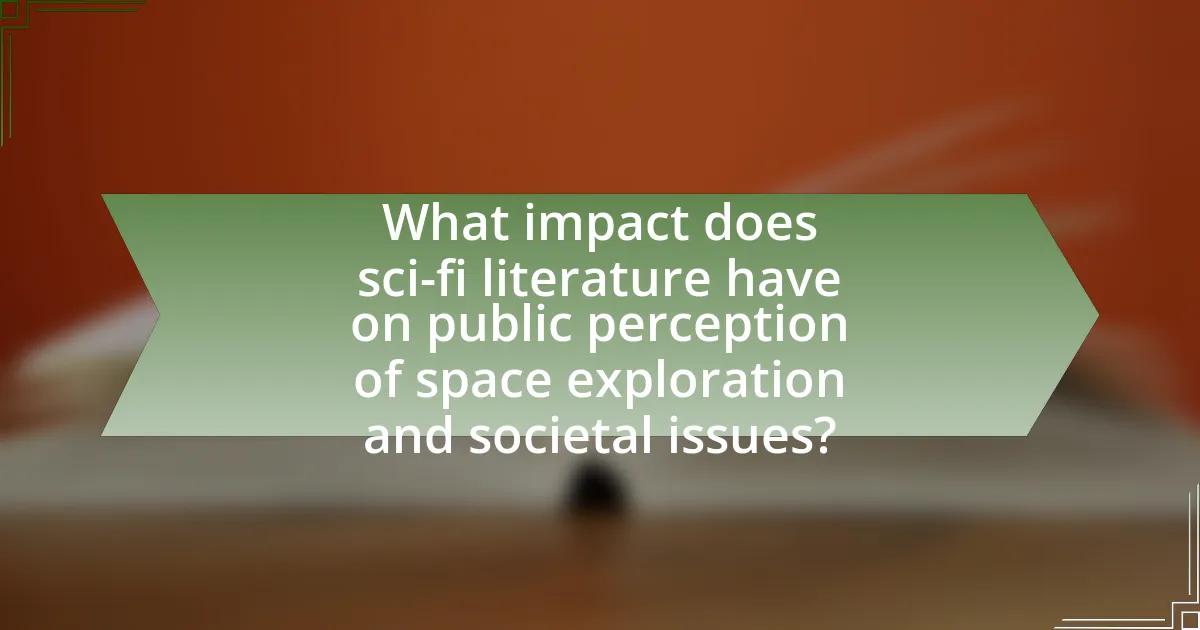
What impact does sci-fi literature have on public perception of space exploration and societal issues?
Sci-fi literature significantly shapes public perception of space exploration and societal issues by presenting imaginative scenarios that provoke thought and discussion. For instance, works like Arthur C. Clarke’s “2001: A Space Odyssey” and Kim Stanley Robinson’s “Mars Trilogy” explore themes of human evolution and environmental sustainability, respectively, influencing readers’ views on the future of humanity in space and the ethical implications of exploration. Studies, such as those conducted by the American Psychological Association, indicate that exposure to sci-fi narratives can enhance public interest in science and technology, leading to increased support for space missions and awareness of societal challenges. This connection between fiction and public perception underscores the role of sci-fi in shaping attitudes toward both space exploration and pressing societal issues.
How does sci-fi literature shape societal attitudes towards space exploration?
Sci-fi literature significantly shapes societal attitudes towards space exploration by presenting imaginative scenarios that influence public perception and inspire interest in the cosmos. For instance, works like Arthur C. Clarke’s “2001: A Space Odyssey” and Isaac Asimov’s “Foundation” series have not only entertained but also sparked discussions about the possibilities of human advancement and the ethical implications of space travel. These narratives often reflect contemporary societal concerns, such as technological progress and environmental sustainability, thereby encouraging readers to consider the future of humanity in space. Research indicates that exposure to sci-fi themes can increase public support for space missions, as seen in surveys conducted by the Pew Research Center, which found that individuals who engage with science fiction are more likely to advocate for increased funding in space exploration initiatives.
What role does sci-fi play in inspiring real-world space exploration initiatives?
Sci-fi plays a crucial role in inspiring real-world space exploration initiatives by stimulating public interest and imagination about the possibilities of space travel. Iconic works like Arthur C. Clarke’s “2001: A Space Odyssey” and the “Star Trek” franchise have not only entertained but also encouraged scientists and engineers to pursue ambitious projects, such as the development of space stations and interplanetary missions. For instance, NASA’s Artemis program, aimed at returning humans to the Moon, draws inspiration from the vision of lunar exploration depicted in various sci-fi narratives. Furthermore, the portrayal of advanced technologies in sci-fi often serves as a catalyst for innovation, leading to real-world advancements in robotics, artificial intelligence, and space travel technologies.
How do readers interpret societal issues through the lens of space exploration in literature?
Readers interpret societal issues through the lens of space exploration in literature by drawing parallels between the challenges faced in fictional space settings and contemporary social dilemmas. For instance, works like Arthur C. Clarke’s “Rendezvous with Rama” explore themes of cooperation and conflict in the face of the unknown, reflecting real-world issues such as globalization and cultural exchange. Additionally, the portrayal of dystopian futures in novels like “The Dispossessed” by Ursula K. Le Guin critiques capitalism and social inequality, prompting readers to consider the implications of these societal structures in their own lives. This interpretative process is supported by the fact that science fiction often serves as a mirror to current events, allowing readers to engage with complex issues through imaginative scenarios.
What lessons can be learned from the intersection of space exploration and societal issues in sci-fi literature?
The intersection of space exploration and societal issues in sci-fi literature teaches that humanity’s challenges are often magnified in the context of the cosmos. Sci-fi narratives frequently explore themes such as inequality, environmental degradation, and the consequences of technological advancement, reflecting real-world societal concerns. For instance, in “The Dispossessed” by Ursula K. Le Guin, the contrasting societies of Anarres and Urras illustrate the impact of capitalism and anarchism on human relationships and resource distribution, prompting readers to consider the implications of their own societal structures. Additionally, works like “The Martian” by Andy Weir highlight the importance of collaboration and innovation in overcoming adversity, mirroring the necessity for collective action in addressing global issues. These examples underscore that space exploration serves as a metaphor for examining and addressing pressing societal problems, encouraging critical reflection on humanity’s future.
How can readers apply insights from sci-fi narratives to contemporary societal challenges?
Readers can apply insights from sci-fi narratives to contemporary societal challenges by analyzing the themes and scenarios presented in these stories, which often mirror real-world issues. For instance, works like “The Dispossessed” by Ursula K. Le Guin explore anarchism and capitalism, prompting readers to reflect on economic systems and social justice in their own societies. Additionally, narratives such as “The Martian” by Andy Weir highlight the importance of collaboration and innovation in problem-solving, which can inspire readers to adopt similar approaches in addressing current global challenges like climate change and resource scarcity. By engaging with these narratives, readers can gain new perspectives and potential solutions to the complexities of modern life.
What are the best practices for engaging with sci-fi literature to understand societal issues?
To effectively engage with sci-fi literature for understanding societal issues, readers should analyze the themes, characters, and settings within the narratives. This approach allows for a deeper comprehension of how speculative scenarios reflect real-world challenges, such as inequality, environmental concerns, and technological ethics. For instance, works like “The Left Hand of Darkness” by Ursula K. Le Guin explore gender and societal norms, while “The Dispossessed” addresses capitalism and anarchism. Engaging with critical essays and discussions surrounding these texts can further enhance understanding, as they provide context and analysis of the societal implications presented in the stories.
